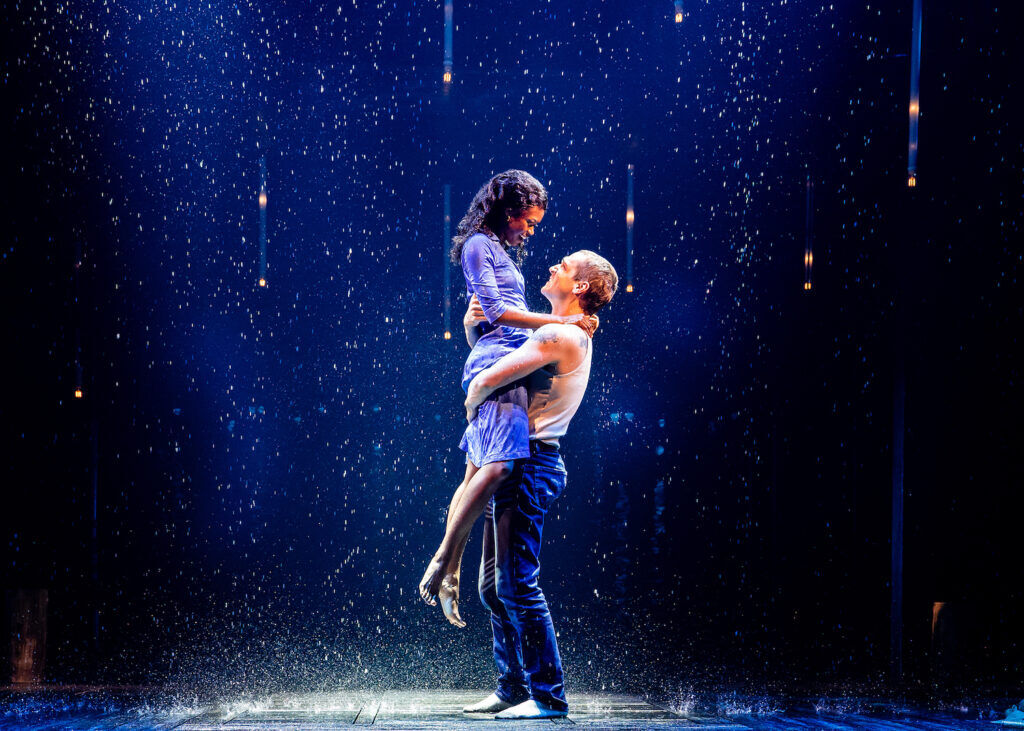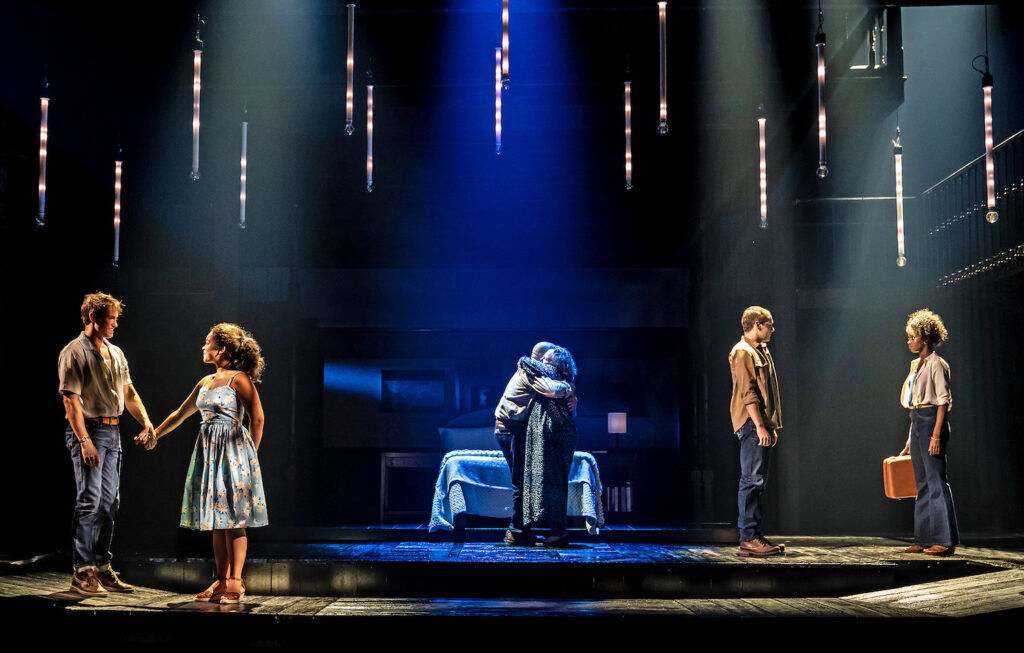“Yearning is in our DNA,” my editor exclaimed when we discussed The Notebook’s pre-Broadway run at Chicago Shakespeare Theater. It is a musing on why a story of boy meets girl, boy loses girl, boy gets girl back a decade later only to eventually lose her again to dementia also resonates with queer audiences.
On its face, The Notebook — the first of countless Nicholas Sparks’ bestsellers, adapted into a 2004 movie that launched both Ryan Gosling and Rachel McAdams into stardom — is cishet in every way. But look deeper, and The Notebook, now an emotionally vibrant stage musical intelligently penned by playwright and screenwriter Bekah Brunstetter and featuring music and lyrics by Ingrid Michaelson, is chock-full of the yearning that makes up many an LGBTQ+ life.
The Notebook begins with an older version of Noah (performed by understudy Jerome Harmann Hardeman on opening night) reflecting on the nature of time. He doesn’t have much left, living in a nursing home and nearly crippled by a knee injury from a long-ago war wound. Allie (Maryann Plunkett), his beloved wife and soul mate, keeps Noah going. She also resides in assisted living but often doesn’t recognize him and is prone to fits of anxiety and rage.
Undeterred, Noah reads to her from a notebook that contains their love story: first, an opposites-attract summer romance between two teens (John Cardoza and Jordan Tyson play the youngest incarnations). A reckoning ten years later reveals Allie (Joy Woods, of Broadway’s Six) on the verge of marrying another, but initiates a reunion with the boy she never forgot (Ryan Vasquez, a standout in an ensemble full of musical muscle) but will she follow her heart?

Like many a queer existence, the course of true love never did run smoothly for Noah and Allie. Noah is a high school dropout working in a lumberyard when they first meet; Allie is a college-bound rich girl whose father makes airplanes. Her parents call the police after discovering the young couple’s first sexual encounter, leading to a decade-long separation, during which Allie studies art history in school and meets a handsome lawyer. At the same time, Noah is drafted into Vietnam, loses his best friend, and builds the house he always dreamed of living in with Allie. While Noah battles loneliness and pines for love long gone, Allie plans a wedding but wonders what could have been if she’d stood up to her parents as a teen.
Like many a queer existence, the course of true love never did run smoothly for Noah and Allie.
As both Brunstetter and Michaelson understand to their bones, The Notebook is a story of angst and longing, two emotions that the queer population knows well. Even now, when it’s ostensibly easier for many (not all) of us to exist, let alone have relationships, LGBTQ+ folks are inherently othered — by family, friends, and society — and familiar with obstacles in life and love. While joyful romances like Bros and Fire Island have fought their way into the mainstream, stories full of yearning that were once de rigueur in queer media still have a significant presence (Portrait of a Lady on Fire, anyone?). The Notebook has both a happy and sad ending: though Noah and Allie reunite, their end-of-life circumstances are fraught due to Allie’s fractured memory. Add Michaelson’s achingly romantic score, and a queer-adjacent story is born.

In both movie and musical iterations of The Notebook, a frustrated twentysomething Noah asks with Allie, about to leave him once again in favor of a life she doesn’t love but knows well, “what do you want?” And therein lies the crux of choice to live loud and proud: what it all comes down to is the one. Not the romantic One of stories, but one person following their destiny — overcoming parental interference, societal expectations, and their own intrusive thoughts telling them the life they want will never work. Here, the choice is Allie’s.
In The Notebook’s stirring 11 o’clock number, “My Days,” Allie sings passionately about wanting to be proud of her choices. She doesn’t desire fame or fortune; she craves home — not just a physical place or Noah, but the “sadness and joy” (a sweet Act One song) that comes with painting, sparring with a loved one, knowing where and when dinner will be. Of course, simple things can be quite complicated. Allie’s existential question is one queer people know: should I stay (in straightness, where it’s “safe”), or should I go (in queerness) toward a life that can be controversial and outright dangerous, but one in which I can live with pride and joy?
Like Allie, queer people choose to go. We always have, and we always will.♦
The Notebook plays at Chicago Shakespeare Theater through October 30.
Don't forget to share:
Help make sure LGBTQ+ stories are being told...
We can't rely on mainstream media to tell our stories. That's why we don't lock our articles behind a paywall. Will you support our mission with a contribution today?
Cancel anytime · Proudly LGBTQ+ owned and operated
Read More in Culture
The Latest on INTO
Subscribe to get a twice-weekly dose of queer news, updates, and insights from the INTO team.
in Your Inbox













